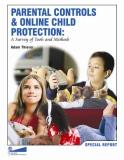 Today, PFF has released my latest book: Parental Controls and Online Child Protection: A Survey of Tools and Methods. The entire publication is online and can be downloaded at http://www.pff.org/parentalcontrols (Note: I will be making constant updates to the book in coming months and will post them to that site).
Today, PFF has released my latest book: Parental Controls and Online Child Protection: A Survey of Tools and Methods. The entire publication is online and can be downloaded at http://www.pff.org/parentalcontrols (Note: I will be making constant updates to the book in coming months and will post them to that site).
As the title implies, the report provides a broad survey of everything on the market today that can help parents better manage media content, whether it be broadcast television, cable or satellite TV, music devices, mobile phones, video game consoles, the Internet, or social networking websites. I put this report together to show policymakers, the press and the public that many constructive options exist that can help parents control media in their homes and in the lives of their children.
While it can be a formidable challenge to be a parent in an “always-on,†interactive, multimedia world, luckily, there has never been a time in our nation’s history when parents have had more tools and methods at their disposal to help them determine and enforce what is acceptable in their homes and in the lives of their children. And that conclusion is equally applicable to all major media platforms. In the past, the OFF button was the only technical control at a parent’s disposal. Today, by contrast, parents (like me!) have myriad tools and methods to restrict or tailor media content to their own household tastes and values. Those restrictive tools include: the V-Chip and TV ratings; cable and satellite set-top box screening tools; DVD blocking controls; cell phone blocking tools; video game console controls; Internet filtering and monitoring tools, instant messaging monitoring tools; operating system controls; web browser controls; search engine “safe search†tools; media time management devices, and so on. You will find an exhaustive discussion of all these tools and many others in my book.
But that's just part of what I discuss in the report. I also highlight how enabling or tailoring tools are what makes today’s parental control market so exciting. By enabling or tailoring tools I mean any tool or method that a parent might use to enable their families to see, hear, or consume content they would regard as more appropriate, ethical or enriching. For example, for televised media, VCRs, DVD players, and personal video recorders have emerged as important parental control devices. These technologies give parents the ability to accumulate libraries of preferred programming for their children and determine exactly when and where it will be viewed. Pay-per-view options also help parents better tailor viewing choices for their kids. And don’t forget about the huge and growing market for educational DVDs, video tapes and computer software.
I also spend an entire section of the report discussing the importance of informal household media rules. Oftentimes, debates about inappropriate content get so caught up with disputes about technical controls, ratings or even regulation that we forget that parents often view all these things merely as backup plans. In my book, I identify four categories of household media rules that surveys show almost all parents use some combination of to control their children’s media consumption. These household media rules include:
(1) “where†rules (assigning a place for media consumption);
(2) “when and how much†rules (creating a media allowance);
(3) “under what conditions†rules (carrot-and-stick incentives); and,
(4) “what†rules (specifying the programming kids can and cannot watch).
Certainly most of us are familiar with widely used household media rules like, “No watching TV or playing games until your homework is done,†or “You can’t watch that movie until you complete your chores.†Such household media rules can actually be more effective in controlling children’s media habits than technical controls. But debates about parental controls and media policy treat these informal media rules almost as an afterthought, if they are mentioned at all.
Finally, and most importantly, I discuss the importance of education and media literacy. As I discussed here last week, education is a vital part of parental controls and online child protection efforts. In fact, if there is one point I try to get across in my new book, it is that, regardless of how robust they might be today, parental control tools and rating systems are no substitute for education--of both children and parents. The best answer to the problem of unwanted media exposure is for parents to rely on a mix of technological controls, informal household media rules, and, most importantly, education and media literacy efforts. And government can play an important role by helping educate and empower parents and children to help prepare them for our new media environment.
I also spend a lot of time in the book debunking myths about social networking sites and online dangers in general, which I believe are greatly overstated. Part V of the book deals with those myths and fears and shows why regulatory proposals like age verification, data retention and mandatory website labeling won't help matters any.
If you're a parent, I hope you find this book to be a useful resource and will let me know if there are ways I can improve it since, as I noted before, I will be posting occasional updates online to keep it fresh. And I hope I will have proven to you (and to policymakers) that there are many constructive alternatives at your disposal that you can tap before turning to government and asking for regulation "for the children." Parents have been empowered. It is now their responsibility to take advantage of the tools and controls at their disposal to determine what is acceptable in their homes and in the lives of their children.
